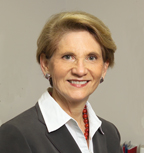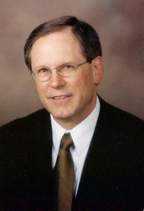The UNMC College of Nursing, with support from Regional West Medical Center in Scottsbluff, will launch an Accelerated Bachelor’s Degree in Nursing program.
The college will admit a class of 10 students in January 2007 at the UNMC College of Nursing West Nebraska Division in Scottsbluff. The application deadline for those interested in applying is June 30.
 |
Virginia Tilden, D.N.Sc. |
Virginia Tilden, D.N.Sc., dean of the UNMC College of Nursing, said the program is good for Nebraska because it addresses the nursing shortage. “The support from Regional West Medical Center makes it possible for us to bring this program to western Nebraska. I am delighted that our long-standing UNMC partnership with Regional West will now include the accelerated pathway to a nursing career.”
Todd Sorensen, M.D., president and chief executive officer, Regional West Medical Center, said Regional West will support the one-year program with an initial $121,000, which will be used to support clinical faculty. Academic and other support will be provided by the college and part of a federal grant.
 |
Todd Sorensen, M.D. |
“We expect the accelerated program will be an ongoing program. I’m thankful to the university for its interest in these kinds of programs. This emphasizes how important it is to recruit non-traditional students and engage them,” Dr. Sorensen said.
Catherine Todero, Ph.D., associate dean for undergraduate programs, UNMC College of Nursing, said the accelerated bachelor’s degree program is intense. It’s estimated students spend 38 to 43 hours a week in class, in clinic or engaged in online studying.
One of the unique aspects of the accelerated program will be the use of creative online theory and virtual/simulation teaching strategies. The tools give students an opportunity to test their knowledge and skills in a simulated environment, which faculty say gives them more confidence before patient encounters.
“Accelerated programs provide one solution to the acute nursing shortage because they take highly motivated individuals with good academic backgrounds and skills and educate them quickly for much needed nursing roles,” Dr. Todero said. “The college is very pleased to be working with Regional West as a partner. We need their support in order for our program to be successful.
“Health care is an economic driver for the community. This program will contribute to the health care provider pool in the Panhandle area. The program will produce a professional nurse who has a broad base of knowledge to help solve clinical problems. These are students who desire a career change to nursing and who bring a breath of life experience to the nursing arena,” she said.
The UNMC College of Nursing graduated its first class of 18 accelerated bachelor’s degree program students last December in Omaha.
For more information, contact Kate Steinbock, ksteinbock@unmc.edu, (308) 632-0413 in Scottsbluff, or Dani Eveloff, develoff@unmc.edu, 1-800-626-8431, extension 95184. To apply online, go to: www.unmc.edu/nursing and click “programs.”